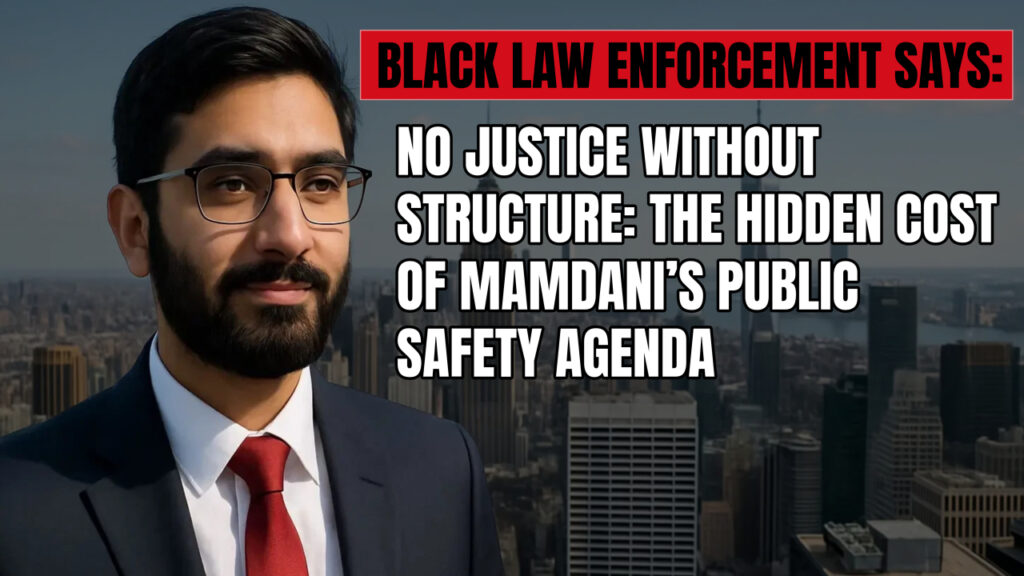By Damon K. Jones, NY Representative of Blacks in Law Enforcement of America
Assemblyman Zohran Mamdani represents a new wave of lawmakers pushing a radical shift in criminal justice—one that centers on closing jails, eliminating cash bail, and minimizing the use of incarceration altogether. His rhetoric is polished, his language is morally charged, and his proposals are marketed as progressive solutions to a broken system.
But stripped of slogans and soundbites, his agenda reveals a dangerous void: a complete lack of structure, accountability, or outcomes-based thinking.
Let’s deal with facts. The justice system is far from perfect. But the answer to dysfunction is not abandonment—it’s discipline.
According to NYPD CompStat, felony assaults have climbed to a 24-year high, with 29,417 reported citywide incidents in 2024—up 5% from the previous year. The surge is particularly evident in precincts covering areas like Harlem, East Flatbush, and parts of the Bronx—communities that are already disproportionately impacted by systemic neglect. NYPD officials have pointed to a 146% increase in repeat felony assault offenders since 2018, linking much of the rise to New York State’s 2020 bail reform law, which severely limited judicial discretion to hold defendants based on their risk to public safety.
In Queens, small business owners continue to report weekly incidents of organized shoplifting, often involving the same individuals who face little to no consequence. Nationally, the National Retail Federation estimates retail theft losses at over $112 billion annually, with much of that driven by coordinated theft rings operating in urban commercial corridors. When repeat offenders are released without supervision, intervention, or accountability, the justice system doesn’t just fail victims—it creates a revolving door of harm that destabilizes the very communities reformers claim to protect.
We are already seeing this play out under New York State’s bail reform, where the absence of structured accountability has led to measurable increases in crime and repeat offenses, particularly in the very communities these reforms claim to protect.
When Mamdani calls for releasing more people from jail without a scalable system of supervision, intervention, or reentry, he’s not solving injustice. He’s shifting the burden of risk onto communities—particularly working-class Black and Brown neighborhoods that already bear the weight of public policy failure.
Before pushing this agenda, did Mamdani sit down with the mothers of murder victims in the Bronx or East Flatbush? Did he speak with Harlem seniors who’ve been assaulted and robbed in buildings with broken locks and no police presence? Has he listened to the Black and immigrant-owned business owners in Queens who are being robbed repeatedly while prosecutors turn a blind eye? Or is he simply echoing the talking points of protest profiteers—those who show up for cameras when police are involved, but disappear when a child is gunned down in a housing project courtyard?
As someone who has championed public safety reform for over three decades, I ask these questions of every policymaker who claims to care about Black communities. And too often, they have no answers. Because they haven’t engaged with the people most affected, their policies deliver nothing but bad outcomes for those who are rarely invited to the table—and yet always pay the highest price.
This is the fundamental problem: too many of these policies are crafted in echo chambers—by people insulated from the consequences of their ideas. They don’t live in public housing. They don’t depend on corner stores that have been robbed three times this month. They don’t walk their kids to school past open-air drug markets or navigate buildings without security patrols.
The removal of cash bail isn’t inherently wrong. But when it’s implemented without a risk-assessment framework—like the Arnold Public Safety Assessment used in other jurisdictions—what you create is not equity, it’s exposure. Exposure to violence. Exposure to repeat victimization. Exposure to a government that now prioritizes ideology over safety.
And while Mamdani touts decarceration as moral progress, there is nothing moral about telling a mother her son’s killer was released without bail because the legislature decided incarceration is no longer justifiable. There’s nothing progressive about building a system that prioritizes political narratives over human life.
I’ve lived reform. I’ve stood up against bad police, challenged abusive systems from the inside, and risked my career to speak the truth. I’ve walked through grieving communities, stood beside mothers of homicide victims, and demanded accountability not only from officers—but from the institutions that failed to protect them.
This is not politics for me. This is lived experience—decades of it. I’m not speaking from an ideological script; I’m speaking from the street, from the courtroom, from the community.
Real reform isn’t just subtractive. It requires building. That means mental health services that intervene before a crisis becomes a crime. It means job training and placement programs that give people real second chances. It means community-based accountability structures—not just defunded police—but neighborhood-based violence interrupters who are trained, paid, and evaluated for results. These are models that have worked in cities like Newark, NJ and Richmond, CA—not by removing systems but by restructuring them with standards.
In contrast, Mamdani’s approach is not built for sustainability. It’s built for applause.
There is a clear distinction between restorative justice and indiscriminate decarceration. One seeks to repair the system with measurable goals. The other operates on blind trust that simply releasing people—without treatment, supervision, or job pathways—will somehow produce safety and fairness. That belief is not just naïve. It’s negligent.
And there are legal implications. Every citizen has the right to equal protection under the law—including protection from foreseeable harm. When the state knowingly releases high-risk offenders without mechanisms of accountability, it raises serious questions about the government’s failure of duty. We don’t just need new laws—we need enforceable oversight.
If the aim is justice, then the standard must be outcomes—not intentions. Does the policy reduce violence? Does it strengthen community trust? Does it create stability? If the answer is no, then it is not justice—it’s just politics.
Our communities don’t need empty gestures. They don’t need activists and legislators chasing ideological purity at the expense of real-world harm. They need systems that function. They need order with dignity, discipline with compassion, and public safety that is proactive—not performative.
This is bigger than Mamdani. This is about a growing class of elite policymakers and foundation-funded activists who speak the language of liberation but legislate disorder. They use the pain of poor Black and Brown communities to experiment with policies they’ll never have to live under. That’s not justice. That’s abandonment.
In the end, it’s not about whether Mamdani means well. It’s about whether his policies keep people safe.
And on that count, his agenda fails the test.
References
- NYPD CompStat 2024 Year-End Report
New York Police Department. “Citywide Crime Statistics.” NYPD CompStat. Accessed July 2025.
https://www.nyc.gov/assets/nypd/downloads/pdf/crime_statistics/cs-en-us-city.pdf - New York State Bail Reform Impact Analysis
New York State Association of Chiefs of Police. “Bail Reform and Repeat Offenders: Data Trends 2020–2024.” March 2024.
https://www.nychiefs.org - National Retail Federation Report on Retail Theft
National Retail Federation. “Shrink Accounted for Over $112 Billion in Industry Losses in 2022, According to NRF Survey.” September 2023.
https://nrf.com/media-center/press-releases/shrink-accounted-over-112-billion-industry-losses-2022-according-nrf - New York Post – Repeat Offenders and Bail Reform
Tracy, Thomas. “NYPD Blames Bail Reform for Spike in Repeat Offenders.” New York Daily News, January 2024.
https://www.nydailynews.com - New York City Small Business Testimonies on Organized Theft
NYC Council Oversight Hearing on Retail Crime. “Testimonies from Queens Small Business Owners.” NYC Council Committee on Public Safety. November 2023.
https://council.nyc.gov/committees/public-safety

